 W
W"Don't ask, don't tell" (DADT) was the official United States policy on military service by gay men, bisexuals, and lesbians, instituted by the Clinton Administration. The policy was issued under Department of Defense Directive 1304.26 on December 21, 1993, and was in effect from February 28, 1994, until September 20, 2011. The policy prohibited military personnel from discriminating against or harassing closeted homosexual or bisexual service members or applicants, while barring openly gay, lesbian, or bisexual persons from military service. This relaxation of legal restrictions on service by gays and lesbians in the armed forces was mandated by United States federal law Pub.L. 103–160, which was signed November 30, 1993. The policy prohibited people who "demonstrate a propensity or intent to engage in homosexual acts" from serving in the armed forces of the United States, because their presence "would create an unacceptable risk to the high standards of morale, good order and discipline, and unit cohesion that are the essence of military capability".
 W
WAble v. United States, 88 F.3d 1280, 155 F.3d 628, is a case from the United States Court of Appeals for the Second Circuit that upheld the Don't ask, don't tell law against various constitutional challenges. Both Able I and Able II overruled district court decisions striking down "Don't ask, don't tell" as unconstitutional.
 W
WMargarethe "Grethe" Cammermeyer served as a colonel in the Washington National Guard and became a gay rights activist.
 W
WCook v. Gates, 528 F.3d 42, is a decision on July 9, 2008, of the United States Court of Appeals for the First Circuit that upheld the "Don't ask, Don't tell" (DADT) policy against due process and equal protection Fifth Amendment challenges and a free speech challenge under the First Amendment, and which found that no earlier Supreme Court decision held that sexual orientation is a suspect or quasi-suspect classification.
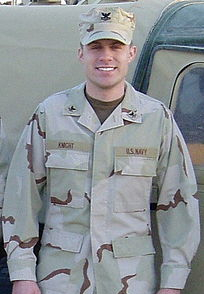 W
WJase Daniels is a United States Navy linguist who was discharged from the military twice under the policy known as "Don't Ask, Don't Tell" (DADT). Daniels served from 2001–2005 and again from 2006–2007. After coming out in Stars and Stripes, a newspaper published under the sponsorship of the U.S. Department of Defense, Daniels challenged the Don't Ask, Don't Tell policy that forbade gay and lesbian service members from serving openly. His case attracted attention in such major U.S. media outlets as Newsweek and the New York Times. Daniels returned to active duty in the United States Navy on December 12, 2011, and is believed to be one of the first servicemembers, and perhaps the first, to return to active duty following the end of restrictions on service by openly gay and lesbian servicemembers in the U.S. Armed Forces.
 W
WThe Don't Ask, Don't Tell Repeal Act of 2010 is a landmark United States federal statute enacted in December 2010 that established a process for ending the "don't ask, don't tell" (DADT) policy, thus allowing gay, lesbian, and bisexual people to serve openly in the United States Armed Forces. It ended the policy in place since 1993 that allowed them to serve only if they kept their sexual orientation secret and the military did not learn of their sexual orientation, which was controversial.
 W
WAndrew Holmes v. California National Guard, 124 F.3d 1126 was a federal court case heard by the Ninth Circuit Court of Appeals, that upheld the "don't ask, don't tell" policy that restricted service by gays and lesbians in the California National Guard of the United States. The court decided that a member of the National Guard could not be discharged for saying publicly that he or she is homosexual or bisexual, but could be restricted to assignments that did not require recognition by the federal government.
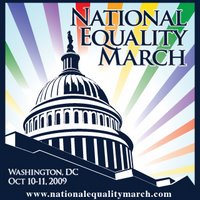 W
WThe National Equality March was a national political rally that occurred October 11, 2009 in Washington, D.C. It called for equal protection for lesbian, gay, bisexual, and transgender (LGBT) people in all matters governed by civil law in all 50 states and the District of Columbia. The march was called for by activist David Mixner and implemented by Cleve Jones, and organized by Equality Across America and the Courage Campaign. Kip Williams and Robin McGehee served as co-directors. Leaders like actress Michelle Clunie, Courage Campaign marketing director, Billy Pollina and New York gubernatorial aide Peter Yacobellis hosted the first fundraiser in the spring of 2009. This was the first national march in Washington, D.C. for LGBT rights since the 2000 Millennium March.
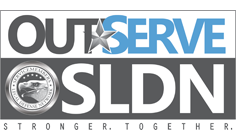 W
WOutServe-SLDN was a network of LGBT military personnel, formed as a result of the merger between OutServe and the Servicemembers Legal Defense Network. OutServe-SLDN was one of the largest LGBT employee resource groups in the world. OutServe was founded by a 2009 graduate of the US Air Force Academy, Josh Seefried and Ty Walrod. There were over 7,000 members and 80 chapters worldwide.
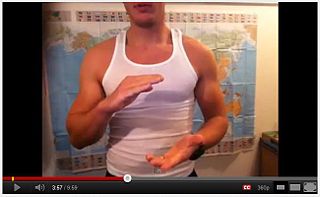 W
WRandy Phillips is an airman of the United States Air Force whose coming out in September 2011 following the repeal of the "Don't ask, don't tell" policy (DADT) garnered media attention. DADT had banned the service of openly gay members in the United States Armed Forces and Phillips used YouTube, under the alias "AreYouSuprised", to anonymously seek support and to document his life under the policy over several months. His videos included his coming out to his father and mother, which coincided with Phillips showing his face for the first time, and the accidental discovery of his anonymous web presence by his co-workers.
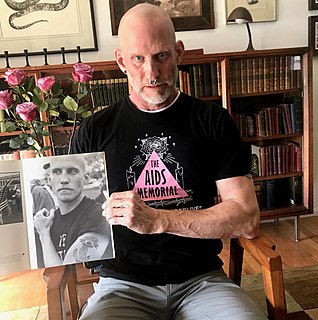 W
WMalcom Gregory Scott also known as Greg Scott, is an American writer, activist, and AIDS survivor. In 1987, the United States Navy (USN) discharged him for homosexuality, after which Scott worked to overturn the Department of Defense (DoD) directive prohibiting the military service of lesbian and gay Americans. Upon his discharge, Scott also learned he had tested positive for the Human Immunodeficiency Virus (HIV), the virus that causes Acquired Immunodefficiency Syndrome (AIDS). He was active in the Washington, D.C., chapters of ACT UP and Queer Nation. Scott was an advocate for legal access to medical marijuana, a critic of early HIV prevention education strategies, and a proponent for expanded academic research to support the public policy goals of queer communities. American journalist Michelangelo Signorile once called Scott "the proudest queer in America." Scott worked as a writer for Fox Television's America's Most Wanted, and his writing has appeared in several newspapers and magazines. Scott nearly died of Stage IV AIDS in 1995 and credited marijuana with his survival until effective anti-retroviral therapies became available.
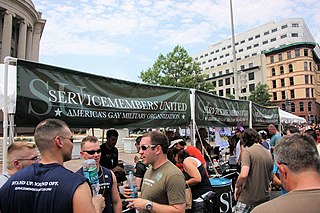 W
WServicemembers United (SU) was an LGBT-interest organization dedicated to the repeal of the United States armed forces' gay-exclusionary policy, commonly known as "don't ask, don't tell". The organization, formerly known as "Call to Duty", formed in 2005 by veterans.
 W
WSoulforce is a U.S.-based social justice organization that supports acceptance of lesbian, gay, bisexual, transgender, queer, and intersex (LGBTQI) people through creative forms of nonviolent direct action. Soulforce is inspired by the principles of relentless nonviolent resistance as taught and practiced by Mahatma Gandhi and Martin Luther King Jr.
 W
WUnfriendly Fire: How the Gay Ban Undermines the Military and Weakens America is an American 2009 political book by Nathaniel Frank that argues that the "Don't Ask, Don't Tell" policy banning openly gay servicemen and women from the United States armed forces weakened military and national security. According to Frank, 12,000 people — 800 of whom had previously been deemed "mission critical" by the U.S. government — were discharged from the military between 1993 and 2008, based on policies that Frank describes as "rooted in denial, and deception, and repression."
 W
WUnited States v. Choi, 818 F. Supp. 2d 79, was a federal criminal case in the United States District Court for the District of Columbia. In November 2010, Choi and 12 other protesters chained themselves to the White House fence in protest of the military "Don't Ask Don't Tell" policy, shouting "Let us serve." All 13 were arrested and charged federally. Choi rejected a plea bargain deal, and trial commenced on August 29, 2011, before United States Magistrate Judge John M. Facciola. It was halted by the prosecution after three days to pursue a writ of mandamus prohibiting the defense of selective and vindictive prosecution. After the writ was issued, Choi was convicted of a single misdemeanor charge on March 28, 2013, and fined $100.
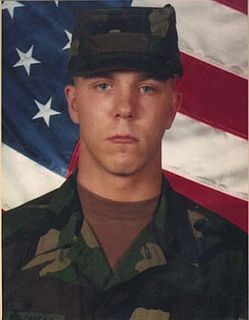 W
WBarry Winchell was an infantry soldier in the United States Army. He was killed by a fellow soldier for dating a transgender woman, Calpernia Addams. The murder became a point of reference in the ongoing debate about the policy known as "Don't ask, don't tell", which did not allow U.S. military gays, bisexuals, and lesbians to be open about their sexual orientation.
 W
WWitt v. Department of the Air Force, 527 F.3d 806 is a federal lawsuit that challenged the constitutionality of 10 U.S.C. § 654, the law, since repealed, that excluded openly homosexual people from serving in the United States military, commonly known as "Don't ask, don't tell" (DADT). The United States Court of Appeals for the Ninth Circuit ruled in 2008 that under Lawrence v. Texas DADT constitutes an "[attempt] to intrude upon the personal and private lives of homosexuals" and it is subject to "heightened scrutiny", meaning that the government "must advance an important governmental interest, the intrusion must significantly further that interest, and the intrusion must be necessary to further that interest."